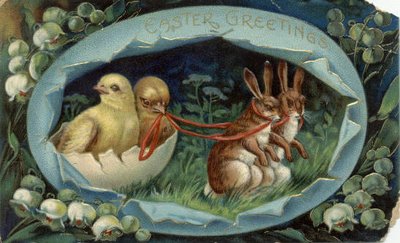
Easter Day is the high point of the festival. A day of parties, gift-giving and above all a celebration that Jesus rose from the dead and lives forever.
Christians around the world celebrate the resurrection of Jesus Christ from the dead.
Eggs play a part in the celebrations because they represent new life.
The date of Easter changes every year.
Easter Day in 2006 falls on Sunday, 16 April 2006.
The Easter Season
The Easter Season begins on Easter Day and lasts 50 days, ending on Pentecost.
The Easter Season begins on Easter Day and lasts 50 days, ending on Pentecost.
What happened on Easter Sunday?
It was on Easter Sunday that Jesus rose from death. Jesus had told his disciples before he was arrested that he would be crucified and on the third day he would rise from the dead. Sunday was the third day from Good Friday.
It was on Easter Sunday that Jesus rose from death. Jesus had told his disciples before he was arrested that he would be crucified and on the third day he would rise from the dead. Sunday was the third day from Good Friday.
What happens on Easter Sunday today?
Christians gather together on Easter Sunday.
Christians gather together on Easter Sunday.
Some Christians take part in an Easter vigil, lighting a new fire outside the church early on Sunday morning. The Paschal candle, decorated with studs to celebrate Christ's wounds, may be lit from the fire and carried into the church where it is used to light the candles of the worshippers. The Easter Eucharist is a particularly joyful service. It is a popular time for baptisms and renewal of baptism vows.
Eggs play an important part in Easter.
Why Do We Give Easter Eggs?
Eggs are a forbidden food during Lent, making them a welcome return to the menu on Easter Day. For Christians, Easter eggs symbolise new life. They believe that, through his resurrection, Jesus defeated death and sin and offers people the promise of eternal life if they follow his teachings. Eggs have been a symbol of continuing life and resurrection since pre-Christian spring celebrations.
Eggs are a forbidden food during Lent, making them a welcome return to the menu on Easter Day. For Christians, Easter eggs symbolise new life. They believe that, through his resurrection, Jesus defeated death and sin and offers people the promise of eternal life if they follow his teachings. Eggs have been a symbol of continuing life and resurrection since pre-Christian spring celebrations.
Eggs had a religious significance in many ancient civilizations; Egyptians buried eggs in their tombs as did the Greeks; A Roman proverb states, "All life comes from an egg". It’s probably no surprise that Christianity should also adopt the egg to symbolise the resurrection of Christ.
The Traditional Egg Gift The first eggs given at Easter were birds eggs. These eggs were painted in bright colours to give them further meaning as a gift. As chocolate was becoming more wide spread in the 20th Century, a chocolate version of the traditional egg was developed. The size of the chocolate egg has grown over the years and is now more likely to be the size of an ostrich egg rather than a small birds egg.
No comments:
Post a Comment